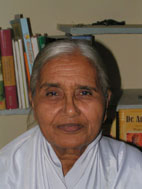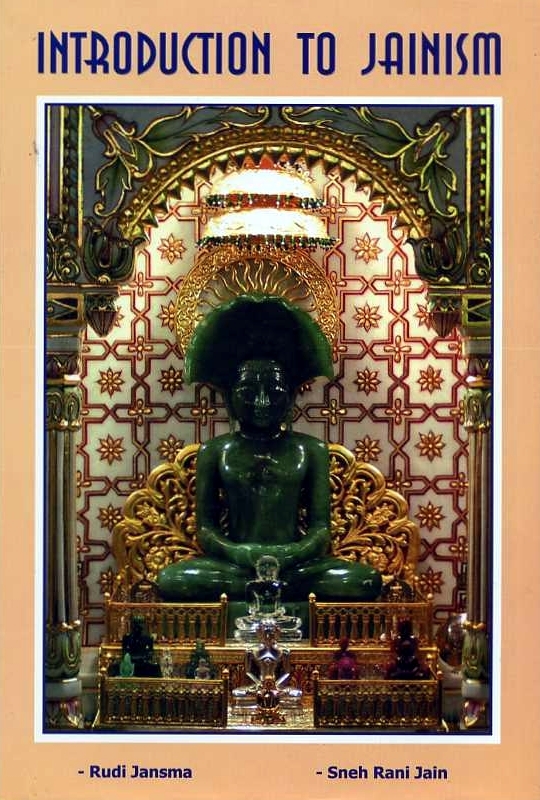In relation to the jīvic or ensouled, i.e. living, substance, cause and effect are directly related to the moral tendencies of the conscious jīvas. The jīva or soul is in its essential nature eternal and perfect, and is characterized by infinite intelligence, infinite peace, faith and power. Its knowledge is boundless. The soul is by itself formless, but during embodiment or incarnation it takes the form and extension of the body in which it resides. The jīva is indivisible and individual. The soul’s characteristic is consciousness (cetanā).
Consciousness is of three kinds:
- consciousness or experience of pure knowledge in its full extent;[36] it is found only in the Omniscient, but it begins to be experienced from the 4th spiritual stage of development;
- consciousness of experience of action,[37] which is experienced by all living beings;
- experience of fruition of karmas.[38] The number of souls remains the same forever - whether they are in any form of embodiment and obscured, or liberated. In the Jain approach the souls always remain individuals, but each soul is in its essence universal, because it has the faculties to know all, and possesses of universal intelligence.
Though our human souls, as well as all others, which reside in the forms of elemental, mineral, plant, animal, and human bodies or those of hell-beings and heavenly beings, are perfect by nature, they are obscured in such a way that their full glory is unable to express itself - like soot on the glass of an oil lamp. This obscuration is due to karma. Therefore the Jain doctrine of karma is intimately connected with the doctrine on liberation of the soul, which means purification from all karmic matter particles. (see Chapter 9).
There are nine fundamental concepts (padārthas) involved in the doctrine of karma: jīva (soul or life); ajīva (non-soul or not-life); virtue, vice; influx or inflow of karmic matter particles;[39] stopping it;[40] bondage;[41] purging of attached karmas;[42] and, finally, liberation.[43] The soul, through vice, causes the inflow of non-ensouled karmic particles and subtle matter which then cause the bondage of the soul. Through virtue or meritorious action the inflow of karmic particles can be stopped and the particles purged, so that the soul is finally liberated. In Jain literature, especially in the Tattvārthadhigama Sūtra,[44] these concepts and the types of karma are worked out in minute detail. On this the whole system of Jain ethics and the path towards liberation is built.
The passions [45] in particular the cause the inflow of subtle matter particles from all directions, which then stick to the soul like “dust to an oily cloth,” as the Jains say, though no doubt this is a very subtle and precise process. Karmic inflow is caused not only by passions, but also by four other types of thought-activities: delusion,[46] lack of self-control,[47] inadvertence,[48] and activities of body, mind and speech.49 Each of these, of course, has its subdivisions. As soon as the influx of pudgala has taken place there is bandha, bondage of karma to the soul. Its nature, duration, intensity and mass are all reflected in the type of karma that is brought about.
The distinction between bhava karma and dravya karma is of key importance in understanding the Jain teaching on karma. The first refers to the thought activity of the soul, the second to the karmic matter which is attracted due to the action of the soul. The first part can purify itself by study, right thinking, and control of the emotions. The second, once it is there, can only be removed by receiving its result, or can be purged. That is why Jains attach so much value to austerities and ascetic practice. Through the effects of the attachment of dravya karmas, the soul is continuously lured into mental action, which is bhava karma. This again attracts new dravya karma. This may go on endlessly, until one decides to enter the path to liberation. Austerities are meant to purge karmic matter. Virtues in the ordinary sense attract punya or meritorious karma. Virtue in the higher sense means no attraction of any dravya karma. But this can only be accomplished by the most progressed ascetics.
The Tattvārthadhigamasūtra was written by Umāsvāmi or Umāsvāti, which the Śvetambaras regard as two names for the same person, but the Digambaras say that the first lived a century BC, the second a century after Christ. The Digambaras do not recognize the version of the Śvetambaras. The differences are small, but subtle, according to the Digambaras.
yoga. “Yoga” in Jainism has an entirely different meaning from the Hindu (and western) meaning of the word. It is the name of the faculty of the soul itself to attract matter, under the influence of past karmas. The activities of body, mind and speech bring this faculty into play (TDS comm. 124).
 Dr. Sneh Rani Jain
Dr. Sneh Rani Jain
 Publisher:
Publisher: